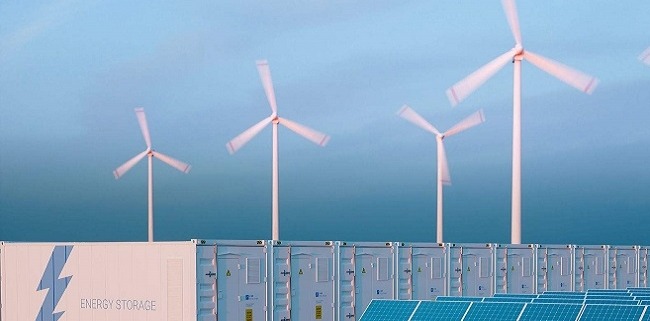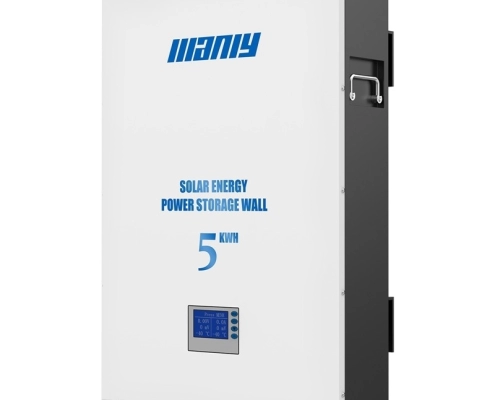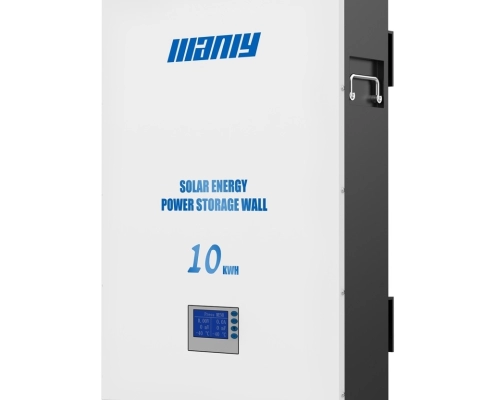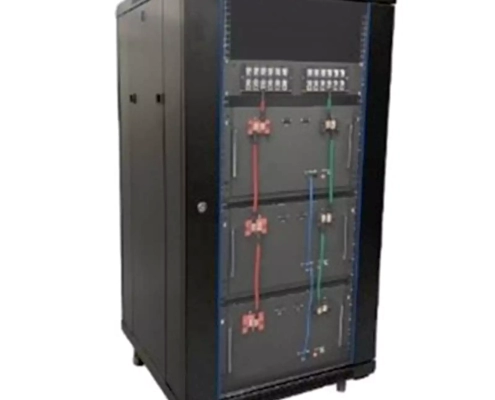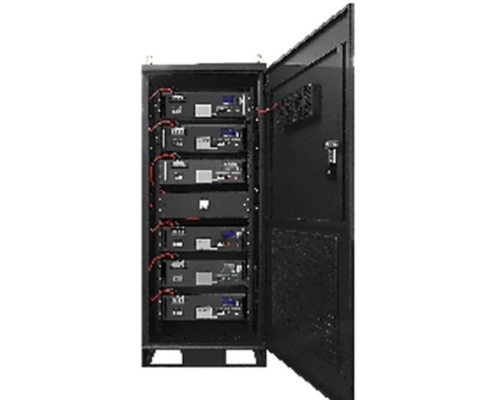Where Do Wholesalers Get Their Products: A Guide to Wholesale Lithium Batteries
Table of Contents
- Where Do Wholesalers Get Their Products: A Guide to Wholesale Lithium Batteries
- What is Wholesaling in the Lithium Battery Industry?
- The Benefits of Buying Lithium Batteries in Bulk
- Understanding the Supply Chain Role of Lithium Battery Wholesalers
- The Profitability of Wholesaling Lithium Batteries
- Conclusion
- Learn More About Battery
- How Long Will My Boat Battery Last?
- SMC Global Power plans to deploy 1GW battery energy storage project in 2022
- Outstanding Solar Batteries Guide for Smart Homes of 2024
- Are Solar Batteries Worth It?
- How Long Do Solar Batteries Last?
- Solar Batteries: How Well Do They Work?
- Selecting the Right Solar Battery
- How Do you Test a Solar Battery Bank?
- How Much Do Solar Batteries Cost
- Best Solar Batteries
In today’s energy-driven world, finding reliable lithium battery suppliers is crucial for businesses looking to provide consistent and efficient power solutions. Wholesalers play a key role in bridging the gap between lithium battery manufacturers and various industries requiring energy storage systems. By sourcing from established lithium battery manufacturers like MANLY Battery, wholesalers can benefit from high-quality products, tiered pricing discounts, and dependable supply chains, ensuring that their customers receive the best solutions to meet their energy needs.
What is Wholesaling in the Lithium Battery Industry?
Wholesaling in the lithium battery industry refers to the process of buying lithium batteries in bulk from a lithium battery manufacturer and then selling them to other businesses, such as retailers or end-users. This model allows wholesalers to obtain products at a discounted price due to the volume of their purchases, which makes it a cost-effective way to acquire high-quality batteries. Wholesalers, in turn, provide these batteries to smaller entities that may not have the ability or need to buy directly from manufacturers. By buying in large quantities, wholesalers help bridge the gap between manufacturers and the marketplace.
In the context of the lithium battery market, wholesalers act as important intermediaries, connecting lithium battery manufacturers like MANLY Battery with various businesses that require batteries for different applications, including electric vehicles, solar energy storage, and other uses. MANLY Battery, for instance, produces a wide range of lithium batteries suitable for multiple industries, and wholesalers distribute these products in bulk to ensure they are readily available to retailers or specialized clients. This system streamlines the distribution of lithium batteries, making it easier for businesses and end-users to access quality products without directly dealing with the complexities of manufacturing.
The key distinction between wholesalers and retailers in the wholesale battery market lies in their roles within the supply chain. Wholesalers purchase batteries in bulk from manufacturers, benefiting from lower costs per unit, and often store these products until there is demand. They serve as a link, ensuring that smaller retailers have a reliable supply of lithium batteries. Retailers, on the other hand, sell these batteries in smaller quantities to individual consumers or businesses, typically at a higher price to account for retail operating costs and profit margins. While wholesalers focus on handling large volumes and logistical efficiencies, retailers emphasize customer service and end-user sales.
By acting as intermediaries, wholesalers make the lithium battery market more accessible, facilitating smooth transactions between lithium battery manufacturers like MANLY Battery and the broader market. This model is beneficial for manufacturers, as it allows them to focus on production while wholesalers manage distribution. It also benefits smaller businesses and consumers by providing easy access to high-quality wholesale battery options.
The Benefits of Buying Lithium Batteries in Bulk
Buying lithium batteries in bulk offers several advantages, making it an attractive option for businesses and organizations with high energy demands. Here are some key benefits of bulk purchasing:
- Cost Advantages
One of the primary benefits of buying lithium batteries in bulk is the significant cost savings. Lithium battery manufacturers often provide discounted prices for large volume purchases, which reduces the per-unit cost. This cost efficiency is especially valuable for businesses that rely heavily on battery-powered equipment, as it helps to lower operational expenses over the long term. Bulk purchasing allows wholesalers to pass on part of these savings to their customers, making their offerings more competitive in the market. - Efficiency in Logistics
Bulk purchasing of wholesale batteries also brings logistical advantages. It simplifies inventory management by reducing the frequency of orders, which means fewer shipments and lower transportation costs. This streamlined process results in reduced administrative efforts, ultimately making supply chain operations more efficient. For businesses that require a consistent and reliable supply of lithium batteries, buying in bulk ensures that they have adequate inventory on hand, minimizing disruptions in their operations. - Quality Consistency
When buying from a reputable lithium battery manufacturer like MANLY Battery, bulk purchases ensure quality consistency across all units. Receiving standardized products in large quantities means businesses can count on consistent performance for their applications. Quality consistency is crucial for industries that depend on the reliability of lithium batteries, such as renewable energy storage or electric vehicles. This consistency not only boosts confidence in the product but also minimizes risks related to variations in battery performance. - Long-Term Relationships
Bulk purchasing helps foster long-term partnerships between wholesalers and lithium battery manufacturers. By committing to large orders, wholesalers can negotiate better terms and establish a reliable supply chain. These long-term relationships often lead to further benefits, such as priority access to new products, customized battery solutions, and dedicated support from manufacturers. A strong partnership with a manufacturer like MANLY Battery ensures that wholesalers can consistently meet market demands while maintaining high standards of quality and reliability.
Understanding the Supply Chain Role of Lithium Battery Wholesalers
The lithium battery supply chain involves several key stages, starting from raw material suppliers and ending with the final product reaching end-users. This complex supply chain begins with sourcing raw materials like lithium, cobalt, and nickel, which are essential for manufacturing battery cells. These raw materials are then processed and assembled by lithium battery manufacturers such as MANLY Battery into high-quality battery packs, which are distributed to various markets.
MANLY Battery’s Position within the Supply Chain
MANLY Battery plays a crucial role in the lithium battery supply chain as one of China’s leading lithium battery manufacturers. With over 13 years of experience, MANLY Battery produces a wide range of wholesale battery products, including LiFePO4 and lithium-ion batteries, designed for numerous applications like solar energy storage, electric vehicles, and industrial use. Their production capacity, which includes assembling over 3,000 batteries per day, ensures a steady supply of high-quality batteries to meet market demands. Positioned at the manufacturing stage of the supply chain, MANLY Battery is responsible for transforming raw materials into reliable energy storage solutions, providing consistency, quality, and customization to their clients.
How Wholesalers Contribute to the Distribution and Accessibility of Lithium Batteries
Wholesalers serve as the vital link between lithium battery manufacturers like MANLY Battery and the end-users. By purchasing batteries in bulk, wholesalers help distribute lithium batteries efficiently across various markets, ensuring that products are readily available to retailers, installers, and other clients. This bulk purchasing approach not only makes lithium batteries more accessible but also reduces the overall cost for retailers and end-users.
Moreover, wholesalers often handle the logistics of transporting large volumes of batteries from the manufacturer to different regions. This helps streamline the distribution process, making it easier for lithium battery products to reach diverse customers without delays. Through their role, wholesalers also help manufacturers like MANLY Battery focus on core production activities, while they manage distribution, customer relationships, and ensure the products are accessible to a wide audience.
By bridging the gap between manufacturers and end-users, wholesalers play a crucial part in optimizing the lithium battery supply chain. They ensure that high-quality wholesale battery products are available where and when they are needed, ultimately contributing to the growth and sustainability of the lithium battery market.
The Profitability of Wholesaling Lithium Batteries
The profitability of wholesaling lithium batteries is influenced by various factors, including market demand, sourcing strategies, and long-term business relationships. Here are some key factors that impact profitability in this industry:
Factors Impacting Profitability
- AGV Robots
In industrial automation, Automated Guided Vehicles (AGVs) have a strong demand for efficient and reliable power solutions. Lithium batteries, with their high energy density and long cycle life, meet the requirements for continuous operation of AGVs in warehouses and manufacturing facilities. According to a report by QYResearch, the global AGV lithium-ion battery market was valued at approximately RMB 4.2 billion in 2022 and is expected to reach RMB 7.3 billion by 2029, with a compound annual growth rate of 8.3%. This rapid market growth will drive increased profitability for wholesalers. - Solar Energy Storage
Lithium batteries are widely used in solar energy storage systems due to their high energy efficiency, long lifespan, and ability to handle frequent charge and discharge cycles. The transition to renewable energy, especially solar, has significantly increased the demand for reliable energy storage solutions. According to the German Energy Storage Systems Association (BVES), sales of residential solar batteries in Germany are expected to grow by 26% in 2024, with revenue increasing from €3.8 billion in 2023 to €4.8 billion in 2024. This presents wholesalers with an opportunity to meet the growing market demand, ensuring a stable source of profitability. - Golf Carts, Marine Applications, and RVs
The use of lithium batteries in golf carts, marine applications, and RVs is becoming increasingly popular due to their lightweight nature, longer lifespan, and faster charging capabilities compared to traditional lead-acid batteries. For golf carts, lithium batteries are favored for their performance and suitability in both recreational and commercial environments. In marine applications, lithium batteries are preferred for powering boats and yachts due to their reliability, high energy density, and low maintenance requirements. For RVs, lithium batteries provide consistent power for off-grid camping and are compatible with solar panels, making them a reliable energy storage solution. The growing popularity of lithium batteries in these diverse applications presents a significant opportunity for wholesalers to supply high-quality batteries, contributing to increased profitability by tapping into these expanding markets.
Each of these sectors requires reliable power solutions, and the shift towards lithium batteries for their superior performance and longevity creates a strong and growing market for wholesalers. With high demand from diverse applications, wholesalers can tap into various segments to maximize profitability. Additionally, sourcing batteries from an established lithium battery manufacturer like MANLY Battery ensures access to high-quality products, which is essential to maintain customer satisfaction and secure repeat business.
Advantages of Sourcing from Established Manufacturers
Working with established manufacturers like MANLY Battery provides several advantages that enhance profitability. MANLY Battery offers tiered pricing discounts based on order volume—orders of 200 to 500 batteries receive a 5% discount, while orders above 500 batteries receive a 15% discount. This allows wholesalers to significantly reduce their costs and improve profit margins. Furthermore, sourcing from a trusted manufacturer guarantees product quality and reliability, which reduces the risk of returns or customer complaints. MANLY Battery’s certifications, such as UN38.3 and UL, further boost confidence among wholesalers and their customers, making it easier to secure long-term business relationships.
Long-Term Profitability through Partnerships
Long-term profitability in the wholesale battery market is often achieved by building strong partnerships with reliable lithium battery manufacturers. By committing to large orders and fostering good relationships with manufacturers like MANLY Battery, wholesalers can negotiate better pricing and secure a consistent supply of batteries. This consistency is crucial for meeting market demand and avoiding supply chain disruptions. Long-term partnerships also open the door to additional benefits, such as exclusive access to new products, customized battery solutions, and dedicated support from the manufacturer.
Establishing strong relationships with a lithium battery manufacturer like MANLY Battery not only ensures a steady supply of high-quality batteries but also helps wholesalers to position themselves as trusted suppliers in the market. This reputation can lead to more business opportunities, enhanced customer loyalty, and ultimately higher profitability over time.
Conclusion
Wholesaling lithium batteries offers significant opportunities for profitability, thanks to the growing demand across diverse sectors such as solar energy, AGV robots, and recreational vehicles. By leveraging bulk purchasing advantages, fostering long-term relationships with trusted lithium battery manufacturers, and effectively managing logistics, wholesalers can ensure a stable supply of wholesale battery products. Working with reputable manufacturers like MANLY Battery not only provides access to quality and innovation but also builds a foundation for consistent growth and sustainability in the competitive lithium battery market.
Learn More About Battery
According to reports, SMC Global Power, the energy business subsidiary of the Philippine conglomerate San Miguel Corp (SMC), said a few days ago that it will start operating a 690MW battery energy storage project at the beginning of this year. The company expects to deploy 31 battery energy storage systems in 2022, with a cumulative installed capacity of 1GW.
SMC Global Power began to deploy battery energy storage systems last year, when the company revealed that several battery energy storage projects across the Philippines were about to be completed. The company also announced that it will deploy 31 battery energy storage systems by the end of 2022, not only to provide power reliability and frequency control services, but also to integrate 3GW of intermittent renewable energy.
Ramon See Ang, president of SMC, said at the time that the company will deploy solar + energy storage projects in 10 locations in the Philippines, and these projects are scheduled to start operations in 2022.
Although the progress of these solar + energy storage projects has not been updated since then, several large battery energy storage projects owned by SMC have been connected to the grid. The energy storage system integrator Fluence, a joint venture between Siemens and AES, said last year that the company has commissioned two 20MW/20MWh battery storage systems in the 470MW/470MWh energy storage combination that it signed with SMC Global Power to supply and maintain. Can project. The installed capacity of these battery energy storage projects deployed by the company ranges from 20MW to 60MW. The energy storage portfolio purchased and deployed by Fluence for SMC Global Power will be deployed at 13 sites.
Wärtsilä announced in May 2021 that two battery energy storage projects for SMC Global Power have been put into use. The scales of these two energy storage projects are 20MW/20MW and 40MW/40MW respectively, which are part of the 100MW/100MW system energy storage deployment contract announced by Wärtsilä.
According to a document recently released by SMC Global Power, the company’s deployment of battery energy storage projects aims to expand its renewable energy portfolio, including the deployment of solar power generation facilities, liquefied natural gas and hydroelectric power generation facilities to meet the needs of the Philippines for reliable and affordable power generation. The continuous demand for electricity
Are Solar Batteries Worth It?
Table of Contents
Absolutely! Choosing a solar battery for your home is often a wise decision when the money you save is more than the cost of the battery. Think of a solar battery as an investment. While it might add around $10,000 to your solar setup, it pays off through various benefits. Here are some ways solar batteries shine:
- Beat High Prices: Dodge the peak electricity rates with a time-of-use tariff, where costs fluctuate throughout the day.
- Lower Energy Bills: Cut down on how much power you pull from the grid, especially if your bill includes demand charges.
- Reliable Backup: Solar panels vary in output, but a charged battery ensures your lights stay on during power outages or cloudy days.
Why Solar Batteries Are Helpful
Using a solar battery is particularly beneficial if your local power supplier doesn’t support net metering. This means, instead of getting credits for extra solar energy you send back to the grid, you can store it in your battery for later use. It’s a smart move financially, provided the battery costs less than what you’d typically pay for grid power at night.
Also, don’t forget about the 30% federal tax credit, which isn’t just for solar panels! It’s available for home batteries too. Combining this with other local incentives means the return on your solar battery investment gets even better.
How Long Do Solar Batteries Last?
1. Frequency of Usage for Your Solar Batteries
You might notice how your phone or laptop battery doesn’t last as long after a few years. A battery that used to last 12 hours may only last three now. This drop happens to all batteries over time. The more you use and recharge your battery, the shorter its life becomes. Eventually, batteries can’t store or release enough power to be useful.
The lifespan of batteries varies a lot. It’s not about how many years they’ve been around but how often you use them. For instance, if you’re off the grid and use your battery every night, it will wear out faster than if you’re connected to the grid and only use the battery during power outages.
To extend the life of your batteries, keep an eye on the Depth of Discharge (DoD) recommended by the manufacturer. DoD is how much of the battery’s power you use. For example, if you use 10 kWh of a 13.5 kWh battery, the DoD is 74%. Staying within the advised DoD helps your battery last longer.
2. Choosing Your Type of Solar Battery Installation
When it comes to solar storage, you’ve got three main types of batteries: lead-acid, lithium-ion, and saltwater. Lithium-ion stands out as the longest-lasting and often has the best ability to hold power. They’re not the cheapest, but their longer life and high Depth of Discharge (DoD) rate, usually up to 80%, mean you get more use from your stored energy and they might save you money over time.
Lead-acid batteries have been popular for a long time, especially for those living off-grid. They cost less and can store a decent amount of power. However, they don’t last as many charge cycles and have a lower DoD rate, between 30% and 50%. So, while they’re cheaper at first, you might end up replacing them more often.
Saltwater batteries are the new players. They’re safe and environmentally friendly, using salt to hold and release energy. They tend to outlast lead-acid batteries but don’t quite reach the lifespan of lithium-ion batteries. Like lithium-ion, they also have a high DoD rate.
Also, when choosing your solar battery, look at the warranty. Many manufacturers promise their batteries will last a certain number of cycles or years. This warranty means you might not have to pay if the battery doesn’t perform as expected.
3. Storage Conditions for Your Batteries
Batteries don’t like being too hot or too cold. It’s best to keep them in a place like a garage or basement where it’s not too hot or cold. This helps them last longer than if they were outside in tough weather.
When it’s really hot, batteries work harder, and this can make them wear out faster. When it’s freezing, the power inside the battery moves slower, and it won’t last as long as it should. Keeping your battery in a place that’s not too hot or cold helps it work better and last longer.
Lead-acid batteries are pretty sensitive to temperature changes. Most of the time, they do best when kept between 40°F and 80°F. Lithium-ion batteries are a bit tougher. They can handle being a bit below 0°F and up to 140°F, but it’s still better to keep them somewhere that’s not too extreme.
Saltwater batteries also like milder temperatures, best between 23°F and 104°F. They handle temperature changes better than lead-acid batteries but aren’t as tough as lithium-ion ones.
4. The Cycle of Charging and Using Your Batteries
To figure out how long your solar battery might last, think about how many times it can be used up and charged again. This is called a cycle. Each time you use all the power in the battery and charge it back up, that’s one cycle. The more you use your solar battery, the quicker it will go through cycles.
Using your solar battery means it will wear out over time. This happens to all batteries. They can only be charged and used so many times before they don’t work as well anymore. That’s why different batteries last for different lengths of time.
5. Care and Cleaning for Battery Longevity
Solar batteries need a bit more attention than solar panels, which are pretty low-maintenance. For lithium-ion batteries, just check how much power they have every so often. No matter what kind of battery you have, it’s important to keep them clean. Wipe off any dust or dirt and make sure the parts you connect wires to are clean too. Products like the Anker 767 Solar Generator are designed to be tough, resistant to flames, and not affected by sunlight, making them easier to look after.
Solar Batteries: How Well Do They Work?
Solar power is getting more popular because it helps save money and is good for the planet. The problem used to be that solar panels only worked during the day. Any extra energy you didn’t use went back to the power grid.
Now, with solar batteries, you can keep the power your panels make and use it later, like at night when everyone is using a lot of electricity. This way of using your own solar power is called self-consumption and it’s a great way to cut down on energy bills.
When you add a solar battery to your home, you can use much more of the solar power you make. For example, adding a 4 kWh battery to a 5 kW solar system can double how much solar energy you use, from 30% to 60%.
Having a solar battery means you rely less on the power grid and save more money, especially as the payments for giving extra power to the grid get smaller. Plus, if there’s ever a power outage, you’ll still have electricity thanks to your battery.
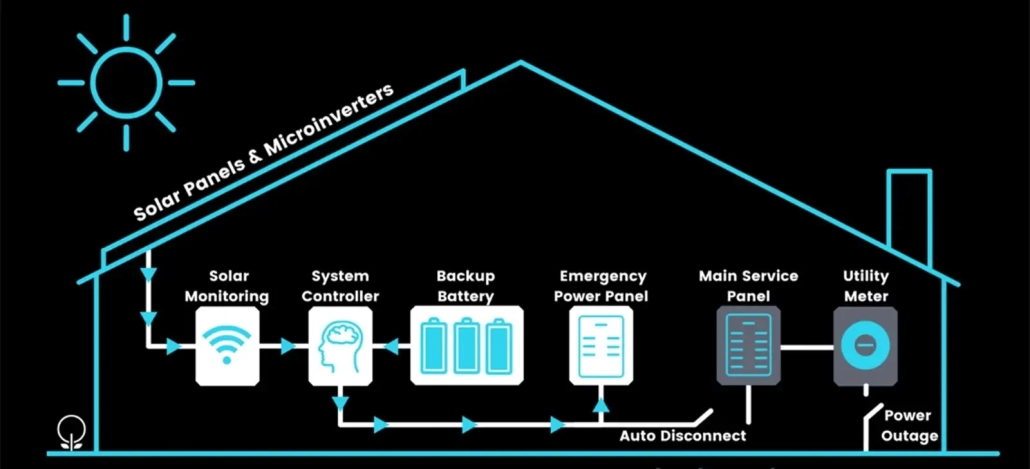
Selecting the Right Solar Battery
How Do you Test a Solar Battery Bank?
It’s smart to keep an eye on your solar batteries, and you can do this in a couple of ways:
The easiest method is to fully charge the batteries in your solar battery bank first. Then, use a multimeter to measure and write down the voltage of each battery. After that, disconnect them from any solar panels and let them sit for a few days. Check the voltage again after this period. If a battery’s voltage has dropped without being used, it likely has a problem, often a broken cell.
Another way is to test each battery by using it to power something, like a lightbulb or heater. Write down the battery’s voltage before you connect the load, then let it run for about 30 to 90 seconds and measure the voltage again. Compare these numbers for all the batteries. A faulty battery will show a bigger drop in voltage compared to the others.
How Much Do Solar Batteries Cost
In the United States, if you’re looking at the EnergySage marketplace, expect to spend about $10,000 to $20,000 for a typical home battery, including the installation. Prices can vary a lot based on different things.
You might be curious about the starting prices for some well-known solar batteries. For those we don’t have exact prices for, we’ve given an estimated total cost that includes installation.
| Battery Brand | Cost |
| Tesla Powerwall | $8,500 |
| Generac PWRcell | $9,999 |
| sonnen eco | $10,000 |
| LG Chem RESU | $9,500 – $13,000 with installation |
| Panasonic Evervolt | $15,000 – $20,000 with installation |
In Australia, Solar Choice keeps track of the average cost of home solar batteries using information from over 200 solar installers. Usually, these batteries cost about $1,000 to $1,300 per kWh of capacity when installed, and this can change based on the brand, size, and where you live.
Here are the latest prices we’ve got, not counting any rebates you might get from your state:
| Battery Size | Battery Only Price | Battery + Inverter/Charger |
| 3kWh | $4,200 | $4,700 |
| 8kWh | $10,000 | $11,100 |
| 13kWh | $16,300 | $17,600 |
| 18kWh | $23,900 | $25,900 |
| Battery Size | Only Battery Price |
| 5kWh Battery | $1280.91 |
| 10kWh Battery | $2547.32 |
| 15kWh Battery | $3833.6 |
| 20kWh Battery | $5109.7 |
| 30kWh Battery | $7693.2 |
(Please note: We only supply batteries. The price of solar batteries may vary each quarter. Before placing an order for our products, please contact us.)
Best Solar Batteries
MANLY 5kWh Battery
The 5kWh battery, backed by a 10-year warranty and a range of certifications including UN38.3, IEC62133, UL, and CE, maintains stability even in the most extreme conditions. Constructed from LiFePO4 cells, it meets the highest safety requirements. Enhance its performance with a customizable smart BMS that not only monitors but also balances the cells, ensuring maximum protection. This BMS seamlessly integrates with leading inverters such as Growatt, Goode, Deye, Luxpower, and SRNE.
MANLY 10kWh Battery
Discover our 10 kWh home battery, tailored for solar energy storage solutions. This wall-mounted unit boasts a 48V and 200Ah specification, powered by superior MANLY lithium iron phosphate cells for unmatched safety and efficiency. Designed for endurance, it offers 8000+ deep cycles, assuring lasting reliability. The powerwall features a maximum 100A discharge capacity and is safeguarded by an integrated BMS. Its modular design is sleek yet sturdy, with laser welding to enhance durability. The 10kWh battery is not only easy to install but also comes with critical safety features like overvoltage and overcurrent protection, ensuring secure operation. Plus, its robust build is engineered to withstand severe impacts, mitigating risks of explosions or fires.
MANLY 15kWh Battery
The 30kWh battery, designed as a 48v 600ah rack-mounted unit, is ideal for residential energy storage. Crafted with A-grade LiFePO4 lithium iron phosphate cells, it provides top-notch safety and reliability. Its high conversion efficiency and powerful output are complemented by an impressive 95% energy ratio, significantly minimizing the product’s size and weight for economical shipping and easy installation.
Optional LCD displays keep you informed about the battery’s working status, voltage, and cycle count. This battery is compatible with major inverter brands and features an all-in-one wall-mounted design for hassle-free setup. The plug-and-play nature simplifies installation further. Plus, for expansive energy needs, you can connect up to 8 of these 30 kWh lithium battery packs in parallel, offering adaptable solutions for a variety of solar home and off-grid energy storage systems.



